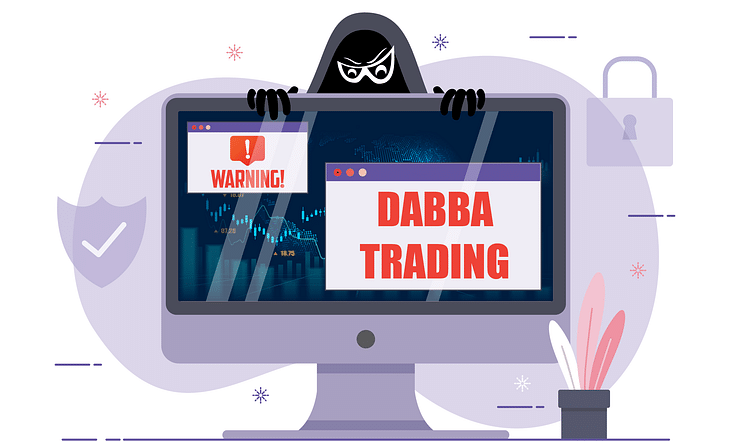Dabba Trading, Another Stock Market Scam

Since the stock market’s inception, traders and investors have found various different ways to profit out of deficiencies. Some have been beneficial to the public, whereas others have cost people their life savings. For example, the ‘Free Stock Tips’ Scam, The Harshad Mehta Scam, and many more. Out of the pool of illegal activities, one such scam has been going on for over two decades, It's called Dabba Trading.
Small-time operators/bookies have reported a market of Rs 6,000 crores per day in Dabba Trading. On the other hand, some operators/bookies have reported a market of up to Rs 1 lakh crores per day. Nobody knows how big the sea of Dabba Trading is. Dabba Trading is an illegal activity and can get you in trouble with the authorities. First, let us understand what it is.
What is Dabba Trading?
In a normal trade, where one has to buy shares, the trader places a buy order with a broker (Zerodha, Upstox, etc.). The broker, on its client’s behalf, executes the order in the stock exchange. Once the broker finds a seller in the stock exchange, it buys and deposits the shares into the client’s Demat account. Once the trader sells the shares, the broker takes back the shares from its client and deposits money into its client’s accounts. This is a legal transaction that is approved by the regulatory authorities.
In Dabba Trading, the trader places an order with a bookie. A bookie in our case is an unethical middleman who ‘writes down’ trades in a record and executes them ‘off the market’ or ‘outside of the trading system’. The bookie uses real-time stock market prices as a benchmark to execute trades. In case a trader makes a profit, the bookie has to pay the trader from his own pockets and in case a trader makes a loss, the trader gets the differential amount as profit. Since this market is unregulated, the bookie accepts or operates order in a way that benefits the bookie. Oftentimes, when the market turns against odds, bookies tend to abscond, causing the trader or client to lose money.
Many people fall for the ‘Dabba Trading’ trap out of greed to make easy money and then find out that their ‘bookie’ is absconding. This kind of trading takes place across all segments like Futures And Options, Commodities, and even Bitcoins.
More About Dabba Trading
Dabba traders are often SEBI-Registered companies that give out advertisements that promise ‘multi-bagger’ returns in a short period of time. These ‘agencies’ are often small-time places that get clients registered on their platform and generally accept cash or UPI payments. Sometimes traders don’t even realize that they are a part of an illegal trading ring. It is after they lose their money that they realize that they were a part of a fraudulent scheme.
Why do people indulge in Dabba trading though? It is not just the people with less knowledge about the markets who participate in Dabba trading, sometimes professionals or full-time traders indulge in Dabba trading as well. Whenever someone buys or sells shares, there is a certain tax charged called the Securities Transaction Tax or STT. When you trade off the market, this STT essentially gets waived off.
Another reason why professional traders sometimes tend to participate in Dabba trading is, margin requirements. Margin trading is when individual investors buy more stocks than they can afford to buy - by borrowing money from the broker. This allows traders to assume higher risks and make bigger bets. Traders need to have a basic minimum amount of money in their trading accounts to be able to execute certain trades, mostly futures and options. However, when this amount is large, certain participants are left out of the market as they do not have such kind of money. This is when some traders resort to Dabba Operators since they offer lower margin requirements and therefore can easily make trades.
On December 1, 2020, SEBI’s new ‘peak margin rules’ kicked in, this keeps certain traders from making big bets, and therefore there is speculation that Dabba Trading might go up after this.
Scammers evolve with time. Scammers have now started developing their own trading apps and websites. This is a shift from trading over phone calls to trading over apps. This increases the number of clients that a dabba tarder can have.
Can I Get Into Trouble For Dabba Trading?
The forgery of the electronic records avoiding Securities Transaction Tax attracts section 467/471 of IPC or Forgery. Moreover, you can be tried under Section 420(Fraud), Section 477-A of IPC(Falsification of Accounts), and Section 120 B or criminal conspiracy. You can also be tried under various different codes of the IT Act 2000. All of this can amount to the imprisonment of up to 10 years in jail.
It is advised that market participants avoid unethical ways of making money in the market and stick to well known and registered brokers when trading. Be aware and stay safe from these types of scams!
Check out our article on how amateur investors lose money in the ‘Free SMS/Telegram Stock Tips’ Scandal.


Post your comment
No comments to display